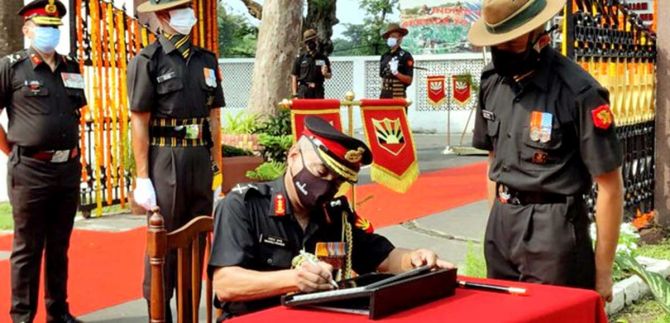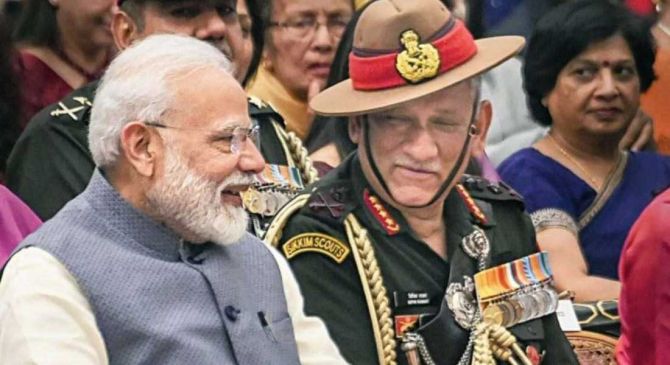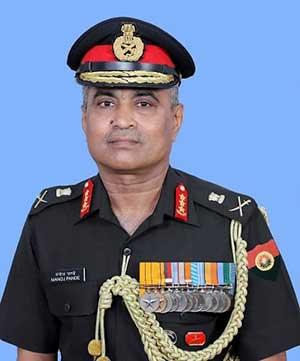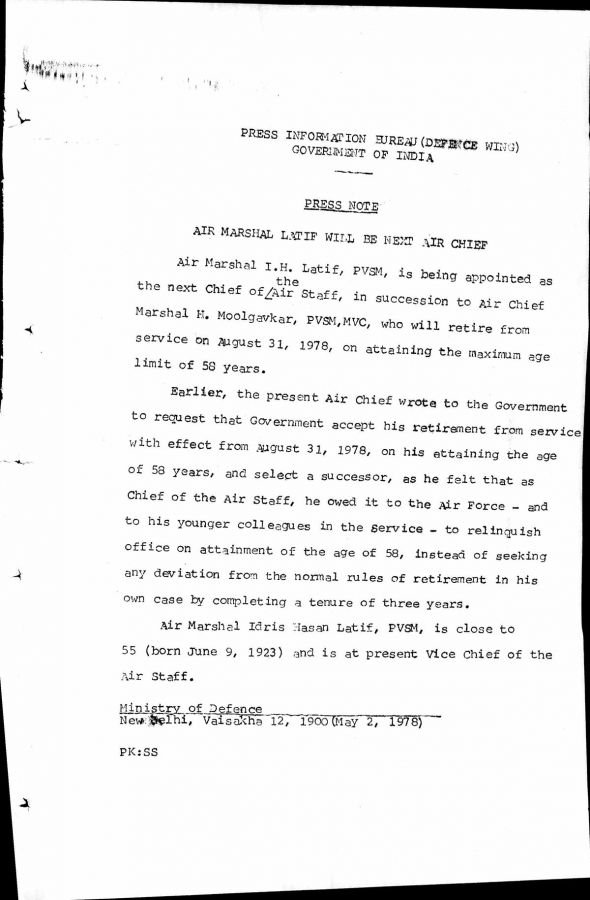If the government of the day would like to set in place a smooth and well-planned changeover and facilitate the incoming chief to chalk out his action plan well in advance, the announcement of a successor needs to be done early, observes Colonel K Thammayya Udupa (retd).

General Pande will take over as the chief of the army staff on May 1, 2022. Photograph: ANI Photo
Mr Narendra Modi, in his prime ministerial address to the nation from the ramparts of the Red Fort on August 15, 2019 had announced the decision to create the post of Chief of Defence Staff.
It is said that the agenda of defence reforms is close to Mr Modi's heart. As such, it was widely believed that the vacancy caused by the death of India's first CDS General Bipin Rawat in the tragic helicopter accident on December 8, 2021 would be quickly filled up.
Four months later, we still do not have a CDS.
In many WhatsApp groups, especially those of defence forces veterans, rumours and gossip of behind-the-scenes machinations along with narratives of palace intrigue are doing the rounds regarding the likely next CDS.
The Government announced the name of the successor of General Manoj Mukund Naravane's successor only on Monday, April 18, 2022. General Naravane will superannuate as chief of the army staff on April 30, 2022.

In normal circumstances, the date on which a serving service chief would vacate the chair on superannuation is well known.
If the government of the day would like to set in place a smooth and well-planned changeover and facilitate the incoming chief to chalk out his action plan well in advance, the announcement of a successor needs to be done early.
As a chief designate, the successor should have enough time to get briefed by the environment as well as to put in place the team of personnel to suit his vision.
These activities could take anything up to two months. Hence there was some logic in announcing the names early.
In the past, it was generally believed that the name of an officer designated to succeed a retiring service chief would be announced nearly two months in advance, to allow a planned, smooth changeover to take place.
Not so any more, ever since Mr Narendra Modi-led National Democratic Alliance came to power on May 26, 2014.
Let us look at the data of the last 50 years, that is, from 1972.
The press releases from the Government of India's Press Information Bureau are available on its Web site, from which one may collate this data.
On the day the appointment of a new service chief is confirmed and ready for announcement, the PIB issues a press release.
From 1972, 60 service chiefs have been appointed, 21 in the Indian Army (General G G Bewoor to General M C Pande), 19 in the Indian Navy (Admiral S N Kohli to Admiral R Hari Kumar) and 20 in the Indian Air Force (Air Chief Marshal O P Mehra to Air Chief Marshal V R Chaudhari).
The PIB notification in respect of General BB Bewoor is not available on the PIB Web site.
Amongst the Air Force chiefs, the Press Information Bureau notifications of two -- Air Chief Marshal Dilbagh Singh and Air Chief Marshal S K Kaul -- are also not available.
General Shankar Roy Chowdhary and Air Chief Marshal Denis A La Fontaine took over within a day of appointment by the government because their respective predecessors General B C Joshi and Air Chief Marshal L M Katre died in service.
Admiral Sushil Kumar and Admiral Robin Dhawan took over on the very day their appointment orders were issued as the office was already vacant.
Their respective predecessors, Admiral Vishnu Bhagwat had been removed from office and Admiral D K Joshi had resigned.
So, of the 60, these seven cases are not being considered and we will restrict ourselves to the balance 53.
The data in respect of these 53 officers shows that from 1972 till date, the Government of India has announced the name of any successor service chief on an average 56 days before he is to assume office.
The maximum has been when the government led by Mr Morarji Desai announced Air Chief Marshal Idris Hassan Latif as Air Chief Marshal Hrushikesh Moolgavkar's successor on May 2, 1978.
It was 122 days before he took over on September 1, 1978.
At the other end, Air Chief Marshal Vivek Ram Chaudhari's name as Air Chief Marshal Rakesh Kumar Singh Bhadauria's successor was announced by the current government on September 21, 2021; he took over just nine days later, on September 30, 2021.
Of the 53 appointments in consideration, nine have been under Mr Modi's prime ministership.
The other 44 have been under Mrs Indira Gandhi (10), Mr Morarji Desai (2), Mr Rajiv Gandhi (4), Mr V P Singh (2), Mr P V Narasimha Rao (3), Mr Atal Bihari Vajpayee (5) and Dr Manmohan Singh (14) and one each under Mr Chandra Shekhar, Mr H D Deve Gowda and Mr I K Gujral.
The average number of days in advance of a service chief retiring that the successor's name was announced in these 44 cases, is was 64.

Mr Narendra Modi's government announced Admiral Karambir Singh as Admiral Sunil Lanba's successor on March 23, 2021, 69 days in advance. He took over on May 31, 2021.
Other than this one outlier case, the eight other appointments made by this government follow a pattern.
 IMAGE: Lieutenant General Manoj C Pande, the next army chief.
IMAGE: Lieutenant General Manoj C Pande, the next army chief.General Bipin Rawat's name as the next COAS to take over on December 31, 2016 was announced on December 17, 2016.
Air Chief Marshal Birender Singh Dhanoa took over as the Chief of Air Staff on January 1, 2017 after his name was announced barely 13 days earlier, on December 19, 2016. His successor, Air Chief Marshal R K S Bhadauria took over as CAS on September 30, 2019.
His appointment had been announced on September 19, 2019, 11 days earlier.
General Manoj Mukund Naravane's appointment as COAS was announced on December 17, 2019 and 14 days later he took over. And now, Lieutenant General Manoj C Pande's appointment as COAS has been done just 12 days before he is to take over.
The average number of days in these eight cases is 17.
Announcing the name of a successor service chief as late as possible has now become a characteristic of this government. This stands on its head the earlier belief that an early announcement helps in a well-planned and smooth changeover.
Is there any military reform hidden in this somewhere? Or is it in line with Mr Narendra Modi's proclivity to make important announcements giving very little or no notice, like that of demonetisation on November 8, 2016 and total lockdown on March 24, 2020?
Mr Narendra Modi likes to convey an impression about his decisiveness. So why is it that the nation in general and the armed forces in particular have to go through this suspense of 'Who will be the next Chief?' till the final days of the incumbent's tenure?
Services chiefs appointed in the last 50 years: Dates of announcement of appointment and dates of taking over
Number of days in advance that the name of successor service chief was announced by Government of India since 1972
The notifications issued by the Press Information Bureau:



Colonel K Thammayya Udupa (retired) is a B Tech (Electrical) from KREC (now NITK) Surathkal. He was commissioned into the Corps of Engineers (The Bombay Sappers) in December 1982. He commanded a RAPID Engineer Regiment and took premature retirement from the Indian Army in April 2007.
Post retirement he served in the Indian Institute of Management-Indore.
He lives in Udupi-Manipal and can be contacted at ktudupa@gmail.com
Feature Presentation: Ashish Narsale/Rediff.com










